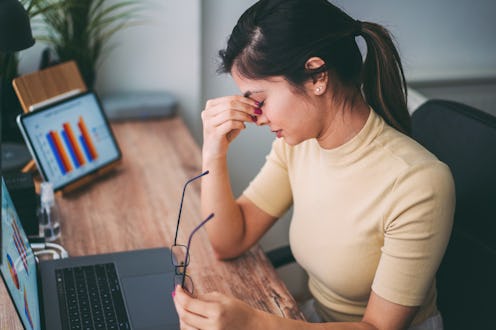Health
Doctors Explain Why, Exactly, Anxiety Leads To Headaches
Plus, what you can do about it.

Your stress levels spike, your anxiety peaks — and suddenly you feel as if there’s a headband tightening around your brain, squeezing it into a tiny cube. Anxiety can have a range of physical symptoms, and experts tell Bustle that headaches are one of the most common.
“A headache brought on by anxiety or stress is something that most people experience at some time or another,” Dr. Seema Sarin M.D., director of lifestyle medicine at EHE Health, tells Bustle. A 2015 study in Cephalagia found that there’s a strong association between high levels of stress and tension-type headaches, regardless of your sex, age, or habits.
Dr. Sarin explains that there are two possible mechanisms that can cause an anxiety head-pounding. “Stress and anxiety can affect your serotonin levels, which can contribute to headaches,” she says. When you’re anxious, the brain often releases neurotransmitters like serotonin, which cause blood vessels to narrow. The more constricted they become, the more likely you are to experience a pain in the head.
If you tend to react to anxiety by tensing your muscles, headaches can also follow. “Headaches can be aggravated by responses to stress or anxiety triggers such as grinding your teeth, tensing your muscles, or clenching your jaw,” Dr. Sarin says. An anxiety attack can bring on the body’s fight-or-flight response, where it prepares to deal with a serious threat: blood starts pumping, your heart rate rises, and muscles across your body tense, leading to headaches. Even lower levels of anxiety or stress can make your head ache, though; you could be tensing your muscles without even realizing.
Anxiety can also cause you to lose sleep, which is a potential trigger for tension-type headaches, too. A 2017 study published in Journal of Headache and Pain found that insomniacs were more likely to experience headaches, and to report higher levels of anxiety and stress.
Migraines, which are more painful than tension headaches and include symptoms like nausea and sensitivity to light, can also be closely linked to anxiety. “Almost half of Americans who suffer from migraines also have anxiety, and those who have migraines are five times more likely to deal with anxiety,” Dr. Sarin says. According to a study published in Journal of Headache & Pain in 2017, anxiety is associated with a rise in migraine risk, particularly in people who find it difficult to control their worrying. It’s not known exactly why this is, but serotonin release after stress is more acute in people who experience migraines, according to Science.
If you think your headaches might be due to stress, says Dr. Michael Richardson M.D., a doctor at medical provider One Medical, it’s important to talk to your doctor; there could be other problems that need to be ruled out first. Once it’s clear that anxiety is the culprit, Dr. Sarin says, treatment will often involve lowering your stress levels (in addition to taking over-the-counter medication to handle headaches in the moment). “Keep in mind that, these headaches can be caused by everyday irritants rather than major life event,” she says. “Once you have determined the root cause, things like relaxation techniques, meditation and other therapies can help you.”
Experts:
Dr. Michael Richardson M.D.
Dr. Seema Sarin M.D.
Studies cited:
Kim, J., Cho, S. J., Kim, W. J., Yang, K. I., Yun, C. H., & Chu, M. K. (2017). Insomnia in tension-type headache: a population-based study. The journal of headache and pain, 18(1), 95. https://doi.org/10.1186/s10194-017-0805-3
Peres, M., Mercante, J., Tobo, P. R., Kamei, H., & Bigal, M. E. (2017). Anxiety and depression symptoms and migraine: a symptom-based approach research. The journal of headache and pain, 18(1), 37. https://doi.org/10.1186/s10194-017-0742-1
Schramm, S. H., Moebus, S., Lehmann, N., Galli, U., Obermann, M., Bock, E., Yoon, M. S., Diener, H. C., & Katsarava, Z. (2015). The association between stress and headache: A longitudinal population-based study. Cephalalgia : an international journal of headache, 35(10), 853–863. https://doi.org/10.1177/0333102414563087